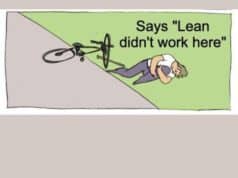I've seen/heard two very different views on valuing white collar employees this week. I'm making an assumption that most of the readers here on the blog are salaried/white collar staff (if I'm wrong, please post a comment).
Much of the lean approach is traditionally tied to environments where people are paid based on their time and physical location — assembly, manufacturing, and even healthcare workplaces. There's not much room for “flex time” on an assembly line that's based upon everyone being there at the same time (or jobs that are based on immediate customer need). However, many white collar jobs should, in theory, provide much more flexibility as far as time and space.
As heard on NPR, Best Buy has gone to one extreme for their HQ staff – ultimate flex time (this wouldn't work with the stores, obviously). Instead of being measured on how much time you spend at work, you're measured upon getting the job done or not. I'm not sure if that is “lean” but it shows a certain “respect for humanity” (a Toyota Production System tenet). Someone commented on the story (you can listen to it via the link above) that by management trusting their employees, that productivity actually improved and people were working harder. That's not surprising to me. A lack of trust is certainly DE-motivating.
On the other side, Salary.com has released their annual “wasted time” study. This approach treats white collar staff as if their value is also based solely on time, rather than value. This study goes into excruciating detail about who is “wasting” what time by doing what (surfing the web, etc.). You might even be “wasting time” by reading this blog, depending on how your management views you.
To me, it seems that the more enlightened approach is to value people based on what they contribute, rather than on some arbitrary time standard. As pointed out in the NPR piece, just because someone is physically present at a desk doesn't mean they are working or doing anything productive.
How are people working in “lean software” or other such “lean office” environments valuing employees' time versus their output? Is there a “lean” way to view this? What do you think?
What do you think? Please scroll down (or click) to post a comment. Or please share the post with your thoughts on LinkedIn – and follow me or connect with me there.
Did you like this post? Make sure you don't miss a post or podcast — Subscribe to get notified about posts via email daily or weekly.
Check out my latest book, The Mistakes That Make Us: Cultivating a Culture of Learning and Innovation:









